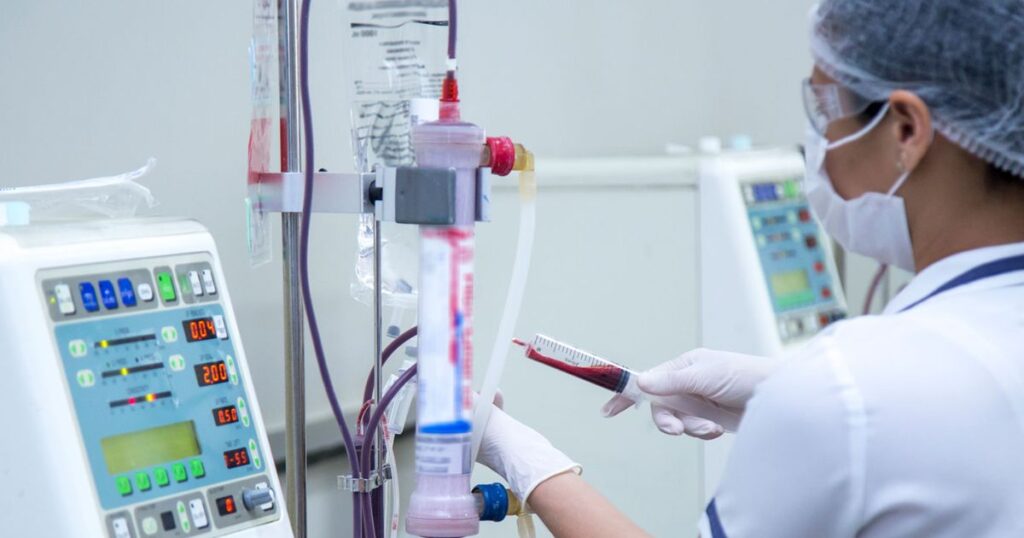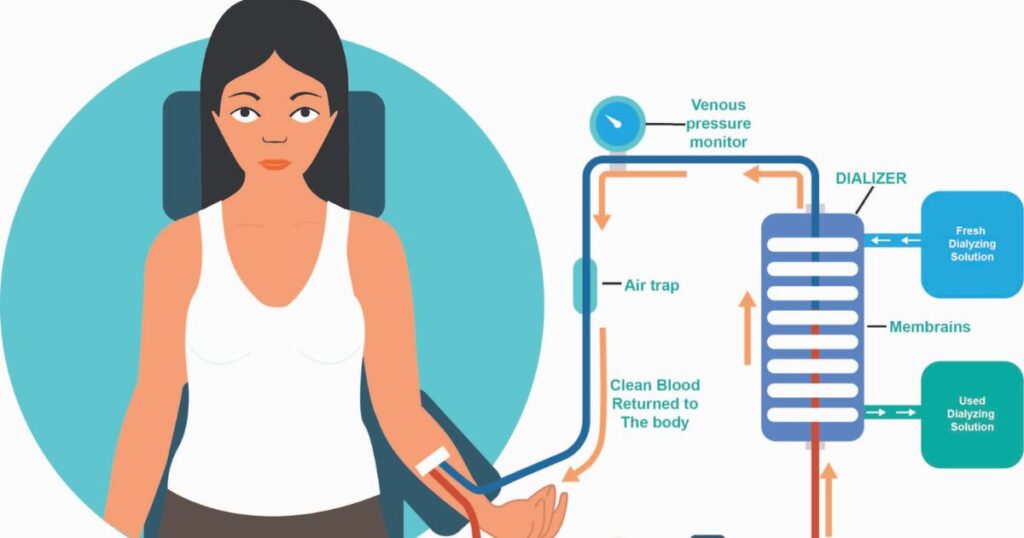A dialysis technician, also called a patient care technician, provides direct support to patients undergoing dialysis treatment. They assist nurses and oversee the dialysis machines and patient care duties during treatment.
Working as a dialysis tech allows you to play an important role in improving patients’ lives by helping filter wastes from their blood during kidney failure. It’s a hands-on job in the growing field of renal care.
To become a dialysis tech you need a high school diploma and complete an accredited training program, which takes 3-12 months. Certification through programs like the Nephrology Nursing Certification Commission is also required. As a tech, you’ll learn to operate machines, monitor treatment, and provide comfort to patients.
What Is A Dialysis Technician?
A dialysis technician is a healthcare professional responsible for operating and monitoring dialysis machines, which are crucial for individuals with kidney failure. They meticulously prepare the equipment, monitor patient vital signs, and ensure the safe and effective delivery of dialysis treatments.
Dialysis technicians play a vital role in maintaining the well-being of their patients, providing compassionate care and technical expertise to improve their quality of life.
What Does A Dialysis Technician Do?
Dialysis technicians are the unsung heroes of the healthcare industry, ensuring the smooth operation of dialysis machines that sustain the lives of those with kidney dysfunction. Their duties encompass a range of critical tasks, from preparing the equipment and monitoring patient vitals to administering treatments and managing medical records.
Also Read This Blog: Do Pharmacy Techs Get Drug Tested
With meticulous attention to detail and a deep understanding of the technology, they safeguard the well-being of their patients, providing a lifeline for those in need of this life-saving intervention.
Dialysis Technician Average Salary

The average salary for a dialysis technician can vary depending on factors such as location, experience, and the specific healthcare facility. According to industry data, the annual compensation for these vital healthcare professionals ranges from $35,000 to $55,000, with the potential for higher earnings in specialized or supervisory roles.
While the monetary rewards may not be the primary motivation for those drawn to this field, the immense satisfaction of directly impacting the lives of patients with kidney disease is a testament to the inherent value of the dialysis technician’s work.
How To Become A Dialysis Technician
Becoming a dialysis technician requires a combination of formal education, hands-on training, and a deep commitment to patient care. Aspiring technicians often complete a certificate or diploma program, which covers topics ranging from renal anatomy to the operation of dialysis equipment.
After acquiring the necessary knowledge, they must undergo supervised clinical practice, honing their skills under the guidance of experienced professionals. The path to becoming a dialysis technician demands dedication, but the opportunity to make a tangible difference in the lives of those with kidney disease makes it a truly rewarding career choice.
1. Earn Your Certificate Or Associate’s Degree
Earning a certificate or associate’s degree is the foundational step for those seeking to become dialysis technicians. These specialized programs provide comprehensive instruction in renal anatomy, dialysis equipment operation, and patient care protocols.
Students gain hands-on experience through clinical rotations, where they can apply their classroom knowledge in a real-world setting. Upon successful completion, graduates are equipped with the skills and credentials necessary to sit for the certification exam, paving the way for a rewarding career in this vital healthcare field.
2. Gain Clinical Work Experience
Aspiring dialysis technicians must complement their formal education with extensive clinical work experience. Under the guidance of seasoned professionals, they hone their skills in setting up dialysis equipment, monitoring patient vital signs, and administering treatments.
Read This Blog: How Much Does Lash Techs Make
This hands-on training allows them to develop a deep understanding of the intricate procedures and protocols essential for ensuring patient safety and comfort. The clinical experience gained during this phase is invaluable, as it prepares future dialysis technicians to confidently and competently navigate the challenges of this dynamic healthcare role.
3. Obtain Your State License To Work

Obtaining a state license is the final step for dialysis technicians to legally practice their profession. This certification process often involves passing a comprehensive exam that assesses their knowledge of renal anatomy, dialysis equipment, and patient care principles.
Once licensed, dialysis technicians are authorized to work in a variety of healthcare settings, from hospitals and clinics to long-term care facilities. The license serves as a testament to their expertise and commitment to upholding the highest standards of patient safety and care, making them integral members of the healthcare team.
4. Continue Your Education To Advance Your Career
Ambitious dialysis technicians can further their careers by pursuing continued education and professional development. Many choose to earn advanced certifications, such as in hemodialysis or peritoneal dialysis, which expand their skillset and open up opportunities for specialization or leadership roles.
Others may opt to complete an associate’s or bachelor’s degree in a related field, such as nursing or health sciences, to broaden their knowledge and enhance their marketability. Ongoing training and education not only benefit the technician’s personal growth but also contribute to the delivery of exceptional patient care, cementing their value within the healthcare ecosystem.
FAQ’s
How Long Does Dialysis Training Take?
Dialysis training programs typically range from 6 to 12 months, ensuring aspiring technicians gain the in-depth knowledge and practical expertise required to safely and effectively operate dialysis equipment and deliver exceptional patient care.
What Are The Qualifications For Dialysis?
The main qualifications for becoming a dialysis technician include completing a certificate or diploma program, gaining clinical work experience, and obtaining a state license or certification, which collectively ensure the necessary knowledge, skills, and competencies to provide safe and effective dialysis care.
How To Make A Dialysis Technician?
To become a dialysis technician, one must complete a formal training program, gain supervised clinical experience, and obtain the required state licensure or certification, which collectively equip individuals with the specialized knowledge and practical skills to operate dialysis equipment and deliver high-quality patient care.
Where Do Dialysis Techs Make The Most Money?
Dialysis technicians can potentially earn higher salaries in specialized roles, supervisory positions, or in certain geographic regions with higher costs of living, but the average annual compensation typically ranges from $35,000 to $55,000, with the primary satisfaction coming from the meaningful impact they have on the lives of patients with kidney disease.
Conclusion
Dialysis technicians play a pivotal role in the healthcare industry, ensuring the well-being of individuals with kidney dysfunction. Through their specialized training, clinical expertise, and unwavering dedication to patient care, they operate the life-sustaining dialysis equipment and monitor critical patient parameters.
While the compensation may not be the primary driver, the profound impact they have on the lives of their patients is a testament to the inherent value and nobility of this essential healthcare profession.








